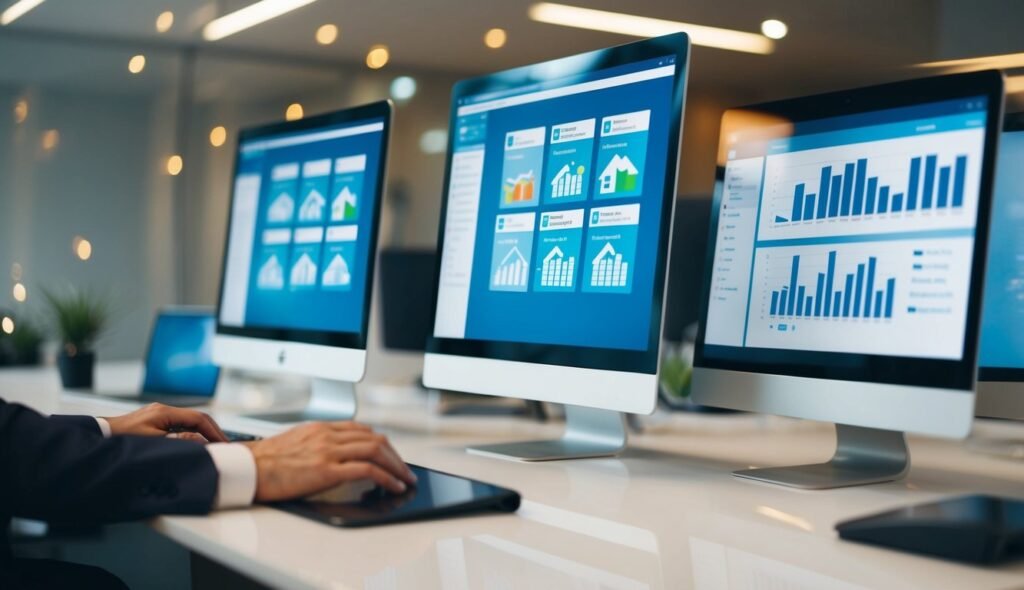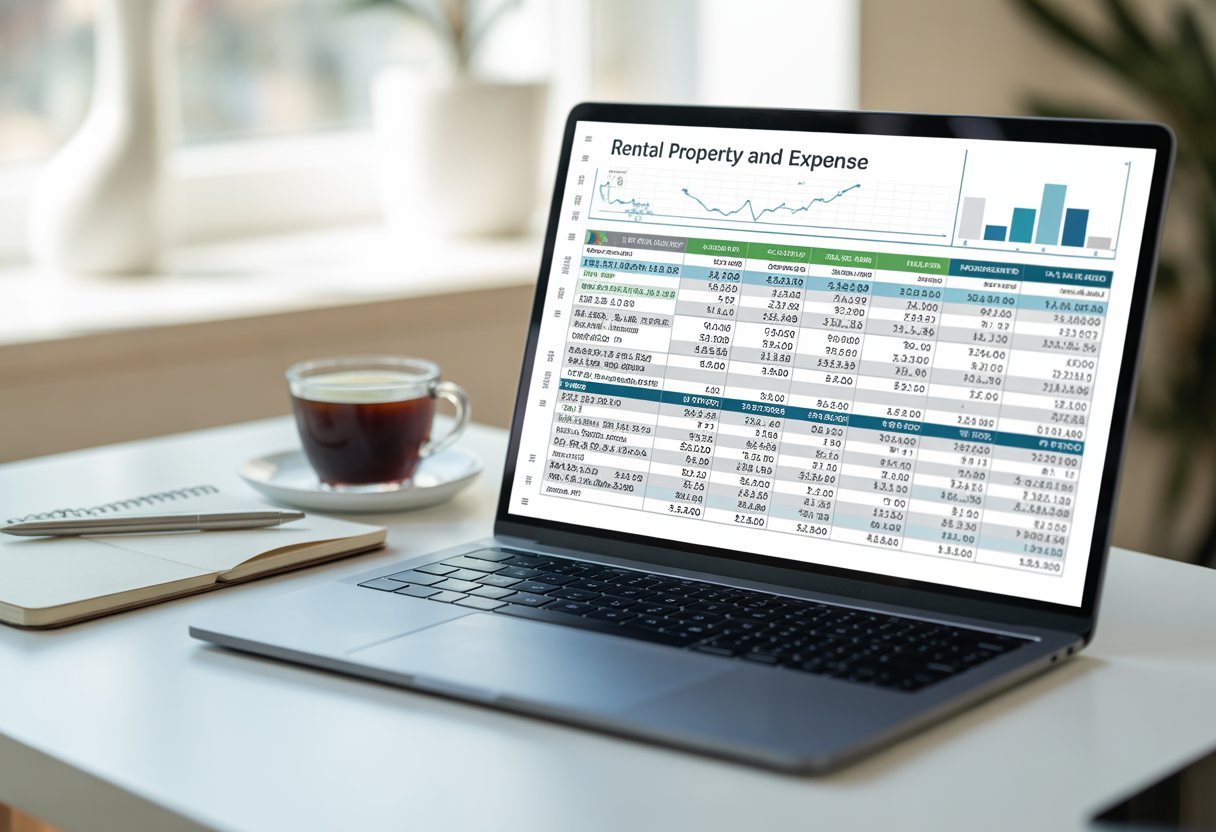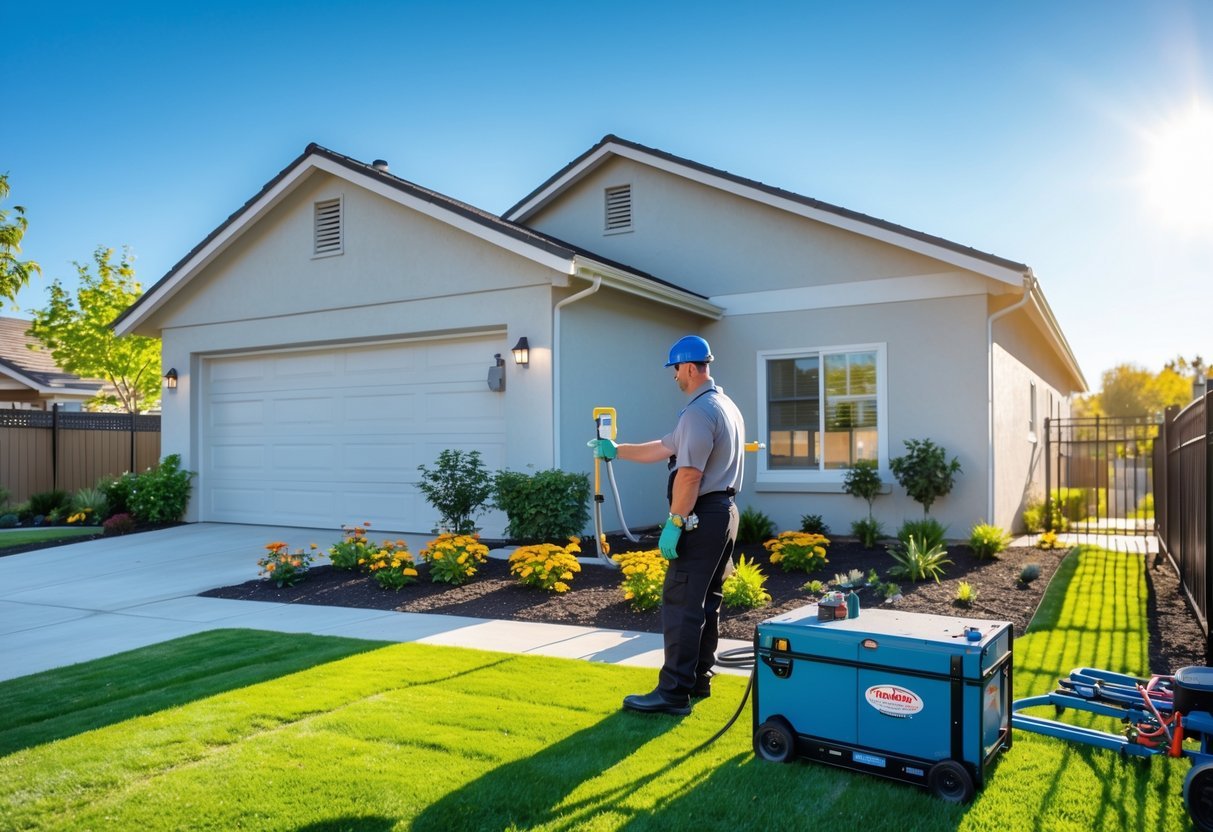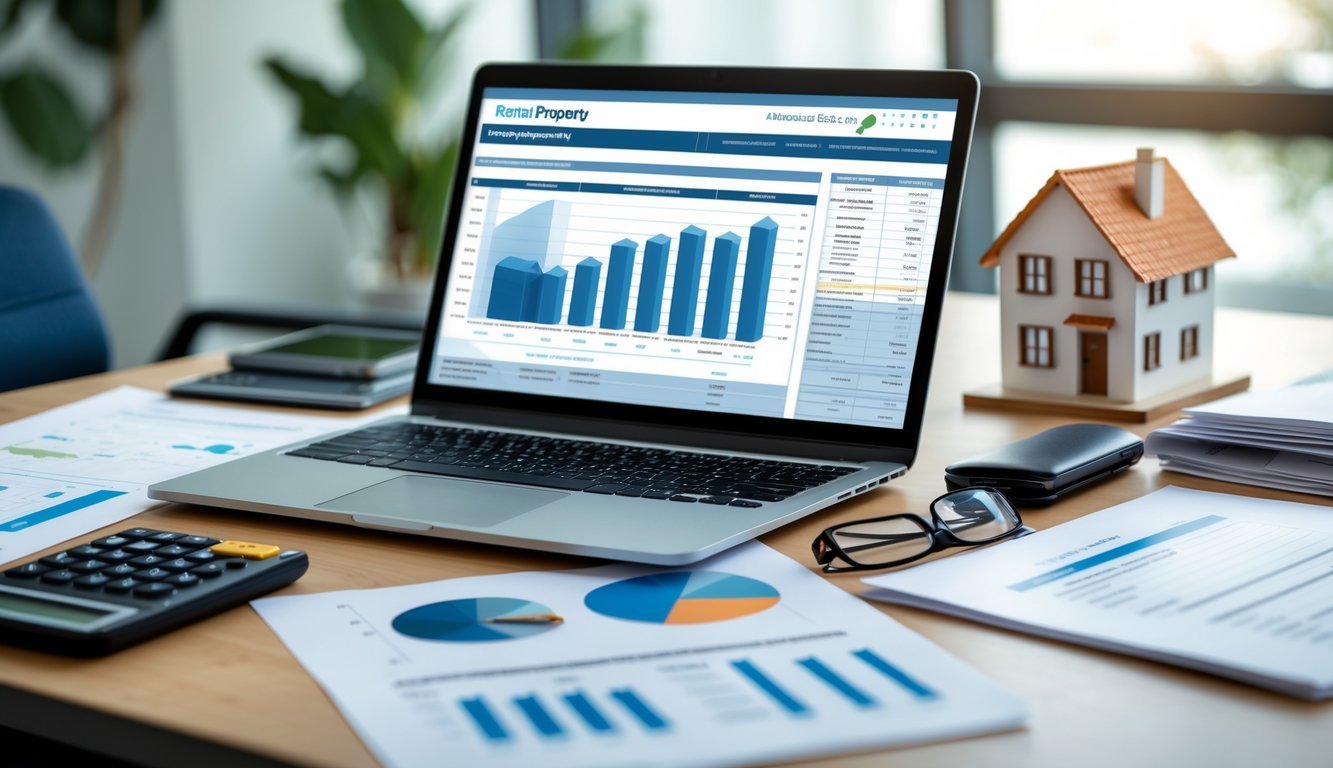Managing rental property finances can be complex and time-consuming without the right tools. Property management accounting software streamlines financial tasks like rent collection, expense tracking, and tax preparation while reducing errors and saving time.
The best property management accounting software combines essential bookkeeping features with landlord tools like online rent collection, tenant screening, and maintenance tracking to create an all-in-one solution for real estate investors. Popular platforms like Stessa and REI Hub offer specialized features designed specifically for rental property accounting needs.
Choosing the right software depends on your portfolio size, budget, and specific requirements. Modern solutions range from basic expense tracking apps to comprehensive platforms that handle everything from tenant applications to financial reporting.
Key Takeaways
- Property management software automates rent collection, expense tracking, and financial reporting in one platform
- The right solution depends on your portfolio size and specific management needs
- Leading software options offer tenant screening, maintenance tracking, and tax preparation tools
What Is Property Management Accounting Software?
Property management accounting software integrates specialized financial tools with property-specific features to help you manage rental income, expenses, and financial reporting for real estate portfolios.
Key Functions and Capabilities
Property management accounting solutions automate rent collection and track payment histories for each tenant and unit.
The software enables you to generate detailed financial reports, including profit and loss statements, balance sheets, and cash flow analyses specific to each property.
You can manage security deposits, set up recurring charges, and track maintenance expenses with dedicated ledgers for each property.
Core Features:
- Automated rent collection and late fee calculation
- Property-specific budget tracking
- Vendor payment management
- Bank reconciliation tools
- Tax document preparation
How It Differs from General Accounting Software
Property management software includes specialized features that standard accounting programs don’t offer, like unit-specific reporting and tenant payment tracking.
The software maintains separate ledgers for each property while still providing consolidated financial views of your entire portfolio.
These specialized tools integrate tenant screening, lease tracking, and maintenance requests directly with accounting functions – features not found in general accounting platforms.
Unique Property Management Features:
- Tenant portal integration
- Lease tracking and renewals
- Unit-by-unit financial analysis
- CAM charge calculations
- Property-specific tax handling
Core Features of Property Management Accounting Software
Modern property management accounting software combines essential financial tools with automation to streamline operations and improve accuracy. These systems integrate seamlessly with daily property management tasks while maintaining detailed financial records.
Accounting Tools and Automation
Property management accounting software includes built-in tools for managing accounts payable and receivable with precision.
The software automatically generates accurate financial statements and reports, helping you track cash flow across your properties.
Built-in automation handles recurring tasks like:
- Monthly rent invoicing
- Late fee calculations
- Vendor payment scheduling
- Bank reconciliation
- 1099 tax form generation
You can set custom rules for payment processing and financial workflows to match your business needs.
Expense Tracking and Bookkeeping
Advanced tracking features help you monitor all property-related expenses in real-time.
The software categorizes expenses automatically and maintains detailed transaction records for each property in your portfolio.
Key expense tracking capabilities include:
- Maintenance costs
- Utility payments
- Insurance premiums
- Property taxes
- Vendor invoices
You can attach digital receipts and documents directly to transactions for complete documentation.
Rent Collection and Online Payments
Modern payment systems enable automated rent collection through multiple payment methods, including credit cards, ACH transfers, and digital wallets.
The software automatically records payments and updates tenant ledgers in real-time.
Payment features typically include:
- Automatic payment reminders
- Custom late fee rules
- Payment plan tracking
- Split payment handling
- Security deposit management
Tenants can access their own portal to view payment history and make secure online payments.
Financial Reporting and Analytics
Property management accounting software provides comprehensive financial visibility and streamlined reporting capabilities to help you make data-driven decisions. These tools automate complex financial tracking while ensuring accuracy and compliance.
Detailed Financial Reporting
Real-time financial reports give you instant access to your property’s financial health. Track income, expenses, and cash flow across individual units or your entire portfolio.
Key financial reports include:
- Balance sheets and income statements
- Accounts receivable/payable aging
- Rent roll analysis
- Bank reconciliation reports
- Budget variance reports
Each report updates automatically as transactions occur, eliminating manual data entry and reducing errors.
Customizable Reports and Real-Time Insights
Modern property management accounting solutions let you create custom reports tailored to your specific needs. Configure dashboards to display your most important KPIs and metrics.
Generate reports by:
- Property or portfolio
- Time period
- Income/expense categories
- Individual tenants
- Unit types
Export reports in multiple formats like PDF, Excel, or CSV for easy sharing with stakeholders and team members.
Tax Preparation and Compliance
Property management software simplifies tax season by maintaining organized records and generating required tax documents automatically.
Built-in features include:
- 1099 form generation
- W9 tracking
- Tax document storage
- Audit trail maintenance
The software keeps detailed transaction histories and proper documentation to support potential audits. Automatic backups ensure your financial records remain secure and accessible when needed.
Your tax-related data stays organized year-round, making it easier to work with accountants and maintain compliance with local regulations.
Property Management and Tenant Communication Tools

Modern property management software simplifies communication between landlords, tenants, and maintenance teams through integrated digital platforms. These tools streamline operations and reduce manual work while improving service quality.
Tenant and Owner Portals
Property management platforms provide secure online portals where tenants can view their lease details, make rent payments, and submit maintenance requests. These portals eliminate paper-based processes and phone calls.
You can give tenants 24/7 access to important documents, payment histories, and announcements through dedicated portals.
Owner portals display real-time financial reports, property performance metrics, and maintenance updates. Property managers can share documents and communicate directly with property owners through these interfaces.
Maintenance Requests and Coordination
Digital maintenance management systems allow tenants to submit requests with photos and detailed descriptions. The software automatically routes these requests to appropriate maintenance staff or contractors.
You can track repair progress, communicate updates to tenants, and maintain detailed maintenance histories for each property.
Advanced platforms include features for:
- Automated work order creation
- Vendor management and scheduling
- Maintenance cost tracking
- Photo and document attachments
- Mobile apps for maintenance teams
Lease Management and Tenant Screening
Modern property management software includes tools for digital lease signing and tenant screening. You can create lease templates, send documents for electronic signatures, and store all lease-related materials securely.
Tenant screening features help you:
- Run background checks
- Verify employment and income
- Check rental history
- Process rental applications
- Store applicant documentation
Digital lease management systems send automatic renewal reminders and track important dates and deadlines.
Integrations and Scalability

Modern property management accounting software needs robust integration capabilities and cloud accessibility to handle growing portfolios efficiently. These features help automate workflows and provide real-time access to critical financial data.
Accounting Software Integrations
Property management software integrations connect seamlessly with popular accounting platforms like QuickBooks, Xero, and Sage. This connectivity eliminates double data entry and reduces errors in your financial records.
Your accounting workflows become automated when rent payments sync directly to your ledger. Bank reconciliation, invoice processing, and financial reporting happen with minimal manual intervention.
Third-party integrations extend beyond accounting to include payment processors, tenant screening services, and maintenance management tools. These connections create a unified system for managing all aspects of your properties.
Cloud-Based and Mobile Solutions
Cloud-based property management platforms give you access to your property data from any device with internet connectivity. You can check financial reports, approve expenses, and monitor cash flow while on the go.
Mobile apps enable real-time transaction processing and instant updates to your accounting records. You’ll receive notifications for new payments, pending approvals, and urgent financial matters.
The cloud infrastructure automatically scales with your portfolio growth. Your software can handle additional properties, users, and transaction volumes without performance degradation.
HTML entities and UTF-8 characters test: Property management & accounting software — it’s essential!
Choosing the Right Property Management Accounting Software
Property management accounting software must align with your operational scale and security requirements while fitting within your budget constraints. When evaluating options, focus on the financial tools and customization capabilities that match your portfolio’s needs.
Pricing Tiers and Customization
Most vendors offer tiered pricing based on the number of units you manage and features required. Entry-level plans typically start at $30-50 per month for basic accounting and tenant management.
You’ll find comprehensive accounting tools that handle security deposits, rent collection, and financial reporting. Look for software that lets you customize financial reports and chart of accounts.
The ability to modify workflows and automate routine tasks saves time and reduces errors. Key customization features include:
- Custom field creation
- Flexible payment scheduling
- Automated late fee calculations
- Tailored financial report templates
Security, Compliance, and Data Protection
Your accounting software must protect sensitive financial data and maintain compliance with industry regulations. Multi-factor authentication and role-based access control are essential security features.
Regular automated backups protect your financial records from data loss. Ensure the software uses bank-level encryption for all financial transactions and data storage.
Look for platforms that maintain SOC 2 compliance and follow GAAP standards for financial reporting. Data protection features should include:
- Encrypted data transmission
- Secure payment processing
- Audit trails for all transactions
- Automated compliance reporting
Top Property Management Accounting Software Solutions
The current market offers specialized accounting tools that combine property management features with robust financial capabilities, helping streamline operations and improve accuracy.
Comparison of Leading Software Platforms
Buildium’s accounting system excels at handling complex property portfolios with automatic transaction tracking and customizable reports.
DoorLoop stands out with its comprehensive accounting features including bank reconciliation, custom chart of accounts, and automated rent collection.
QuickBooks integration capabilities make platforms like TenantCloud and Hemlane attractive for property managers already using QuickBooks for their accounting needs.
Stessa offers free solutions focused on income and expense tracking, with real-time financial dashboards specifically designed for landlords.
Best Overall and Specialized Tools
Buildium ranks as the top overall choice for property management accounting, delivering enterprise-level features suitable for portfolios of any size.
AppFolio and Yardi Breeze excel in handling commercial properties, offering specialized tools for CAM reconciliation and commercial lease management.
LandlordStudio provides targeted solutions for smaller landlords, featuring automated rent collection and expense categorization at a competitive price point.
Rentec Direct specializes in tax preparation features, making year-end reporting and tax document generation straightforward.
Frequently Asked Questions

Selecting the right property management accounting software requires evaluating key features, costs, and functionality that match your specific property portfolio needs. Your choice will significantly impact daily operations and financial management efficiency.
What are the essential features to look for in property management accounting software?
Your property management software must include automated rent collection and payment processing.
The platform should offer bank reconciliation tools and real-time financial reporting capabilities.
Look for software with tenant screening, maintenance request tracking, and lease document management integration.
Which property management accounting software is most suitable for commercial properties?
Commercial property management requires robust features aligned with complex business requirements.
Your software should handle CAM charges, multiple lease types, and complex billing scenarios.
Multi-tenant billing and specialized reporting tools are crucial for commercial property management.
How do the top property management software solutions compare for small landlords?
Small landlords benefit from cloud-based solutions with straightforward interfaces and essential feature sets.
You’ll want software that offers core property management tools without overwhelming complexity.
Monthly pricing should scale based on unit count, making it cost-effective for smaller portfolios.
Are there any reliable free property management software options available?
Free versions typically offer basic features like rent collection and tenant communication.
You’ll find limited functionality in free options, with restrictions on the number of units or transactions.
Basic accounting features may be available, but advanced financial reporting usually requires paid upgrades.
What criteria should be considered when selecting the best property management software for rental properties?
Begin with establishing a separate business account and identify your specific accounting needs.
Consider your technical expertise and the learning curve associated with each platform.
Evaluate mobile accessibility, customer support quality, and integration capabilities with existing tools.
How does property management software facilitate financial reporting and bookkeeping tasks?
The software automates daily accounting tasks and generates real-time financial statements.
Property management accounting tools streamline owner distributions and tax reporting.
You can track expenses, monitor cash flow, and generate custom reports for different stakeholders.



